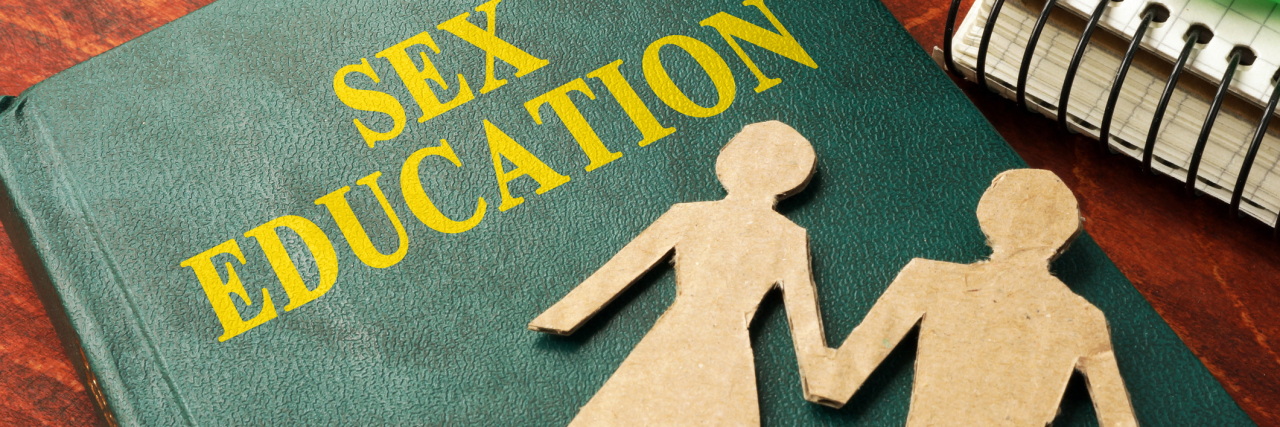Why My 9-Year Struggle With an Eating Disorder Led Me to Teach Sex Ed as an Adult
Editor's Note
If you live with an eating disorder, the following post could be potentially triggering. You can contact the Crisis Text Line by texting “NEDA” to 741741.
When I tell people I teach sex education, I get a vast array of responses. Generally people find it hilarious and fascinating in equal parts. People are usually very interested in things like what topics I teach (it ranges from puberty to pornography), how old the children are (ages 6-18), how I get through lessons without laughing (I’m pretty much immune to the word “vagina” now) and what kinds of questions the students ask (“what’s the average penis size?” gets asked almost every week). Sometimes people ask me how I ended up in this line of work and I’ll answer with a slightly embellished version of my CV. But never before have I spoken about how my passion for Sex and Relationships Education (SRE) is deeply connected to my nine-year eating disorder struggle.
At the age of 13, I developed an eating disorder. It was chaotic and emotional at first, swinging backwards and forwards between restriction and indulgence, before later morphing into anorexia. There were a multitude of factors contributing to my issues around food, some I’m aware of and some I’ll never know about, but I believe a significant factor was — simply — puberty. Or, more accurately, a lack of preparation for puberty.
I had a fairly classic “anorexia-prone” personality: highly driven, organized, routine-oriented, a strong need for control and an inability to cope with change. Those last two are particularly problematic when faced with puberty — a huge, uncontrollable and irreversible change.
13-year-old me didn’t fully grasp how or why my body would change shape all of a sudden. 13-year-old me was terrified and ashamed of this new, uncontrollable monthly curse. 13-year-old me had no idea how to manage or express the intense emotions she was feeling. 13-year-old me felt guilty and alone in her newly-developed sexual desires. 13-year-old me did not want to grow into an adult or face adult responsibilities.
These are changes every girl goes through, and while many seem to cope OK, I wonder if a lack of education, preparation and open conversation about these changes is contributing to the growing number of girls (and boys) with eating disorders and other mental illnesses. You see, my eating disorder gave me a sense of control over my otherwise uncontrollable life. It gave me an outlet for my intense feelings of sadness, anger and shame. It gave me a “practical solution” to my changing body shape. It essentially reversed the effects of puberty, including menstruation and libido. It made me feel small and fragile, like a child. And, to an extent, it kept me in the role of a child.
By no means am I suggesting had I received better (or any) SRE as a child that I wouldn’t have developed anorexia — underlying personality factors, difficult situations at home and depression all undoubtedly played a role. However, I can’t help but feel that good quality SRE could have provided me with something of a toolbox and an emotional resilience to counteract these other factors. Had I known that it is completely normal to gain weight and not just height during puberty, had I known that it’s normal to feel a bit awkward in your body while your fat redistributes itself, had I been taught that it’s OK to talk about periods and that they signify your body’s ability to do something pretty miraculous, had I learned about natural sexual desire before I developed it, and had I heard a positive narrative about teenage and adult life rather than one that was tinged with inevitable gloom — had all of these things been part of the SRE I received, perhaps things may have panned out differently. Perhaps.
Therefore, it is my resolve to change this. One awkward lesson about pubic hair at a time.
In all seriousness — come on educators and parents and youth workers — we can do better than this half-hearted, rather-be-avoided, sugar-coated, prudish SRE that we currently offer our children. They need real information, real life application and real honest answers (they’ll only Google it if we don’t get in there first). We need to swallow our pride and embarrassment and be as unfazed by their questions as they are, so that no more 13-year-olds stumble through puberty thinking they are the only ones struggling or regarding their body’s natural, weird and beautiful changes as “taboo.”
Getty Images photo via designer491

